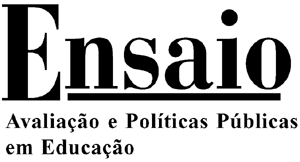Abstract
Bourdieu and Passeron defended the thesis that the school was the main locus to legitimate and perpetuate class differences. This is reinforced by the multiple proficiency tests used to monitor public policies, which privilege the use of the formal language as part of the instruments and, therefore, penalizes participants with less mastery of the language. We adjusted two hierarchical models with Enade’s results on standard Portuguese grades, using as covariates, indicators of students’ socioeconomic status and economic independence and average values for these variables for the knowledge areas. The linguistic performance is disaggregated into three aspects: textual, orthographic and vocabulary/morphosyntactic. More affluent socioeconomic groups have greater proficiency in the Enade Portuguese Language component, even when controlling for the knowledge area average socio-economic level and financial autonomy of the students. The socioeconomic effect is not as strong as on lower educational level: university students constitute a rather homogeneous group. This reinforces Bourdieu’s thesis that through the social, cultural and economic capital still prevails the domination of wealthier classes over more popular classes, reinforcing the inequality.
Social Capital; Economic Capital; Social Inequality; Linguistic Performance; Enade; Public Policy; Hierarchical Models
